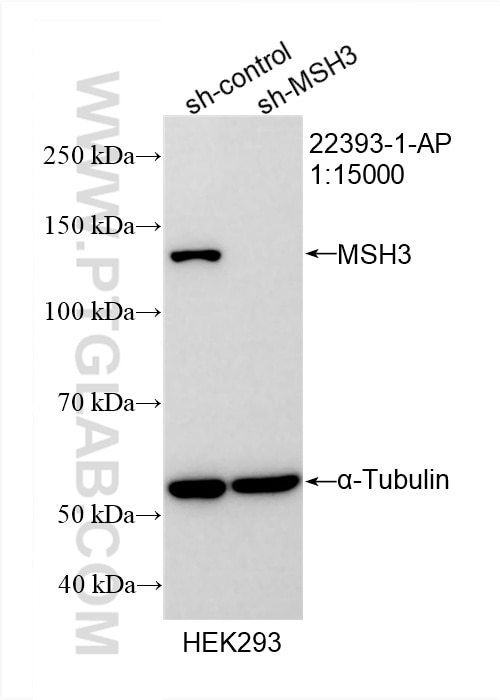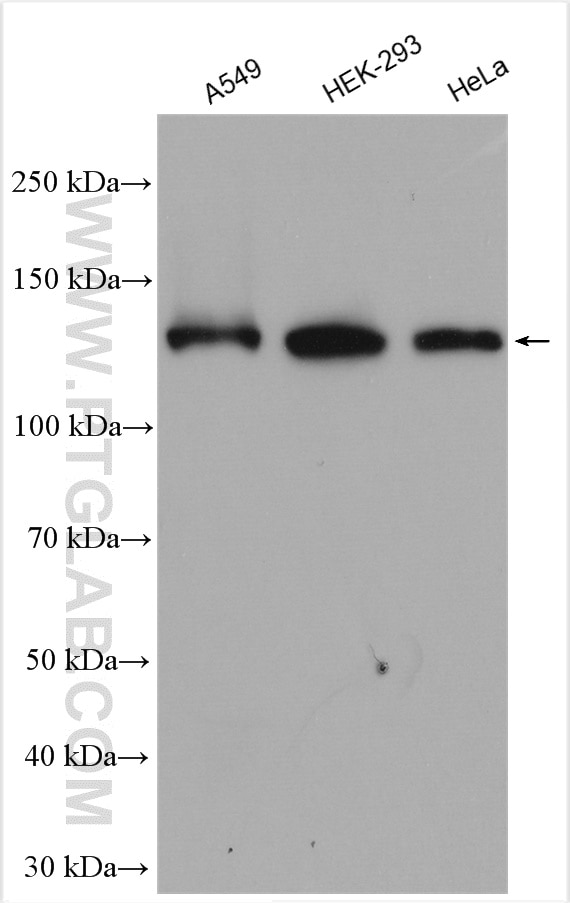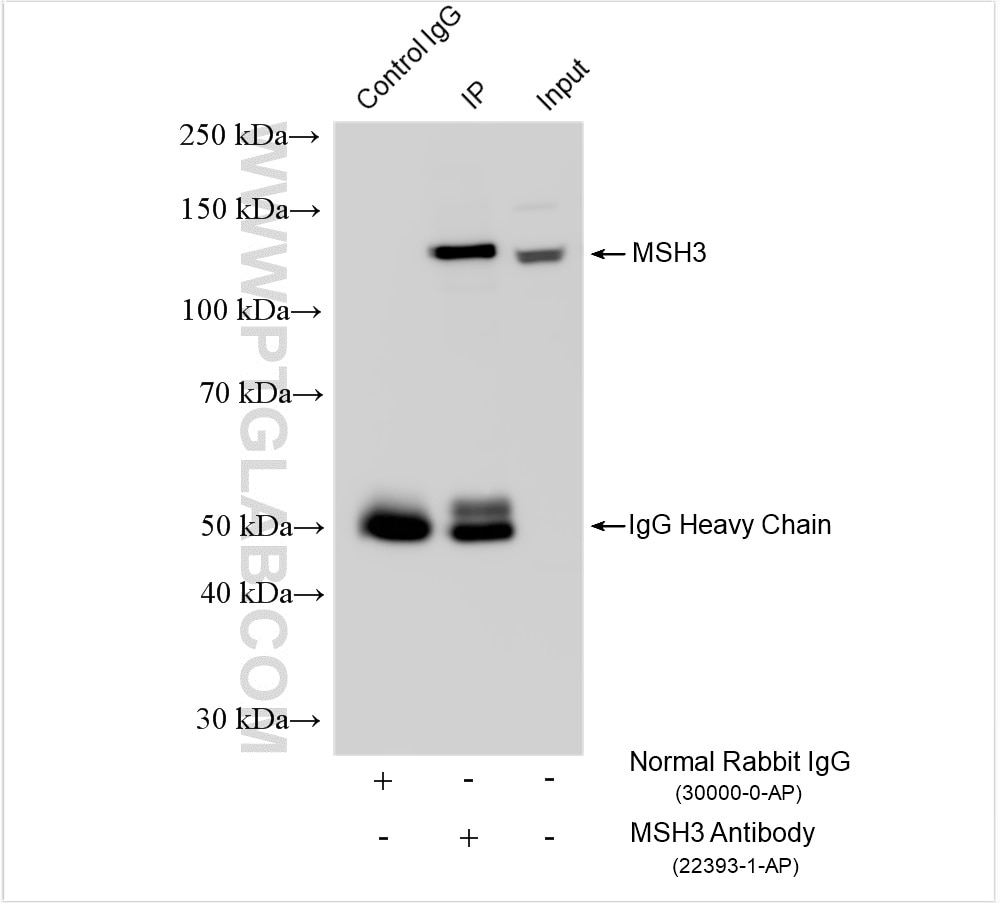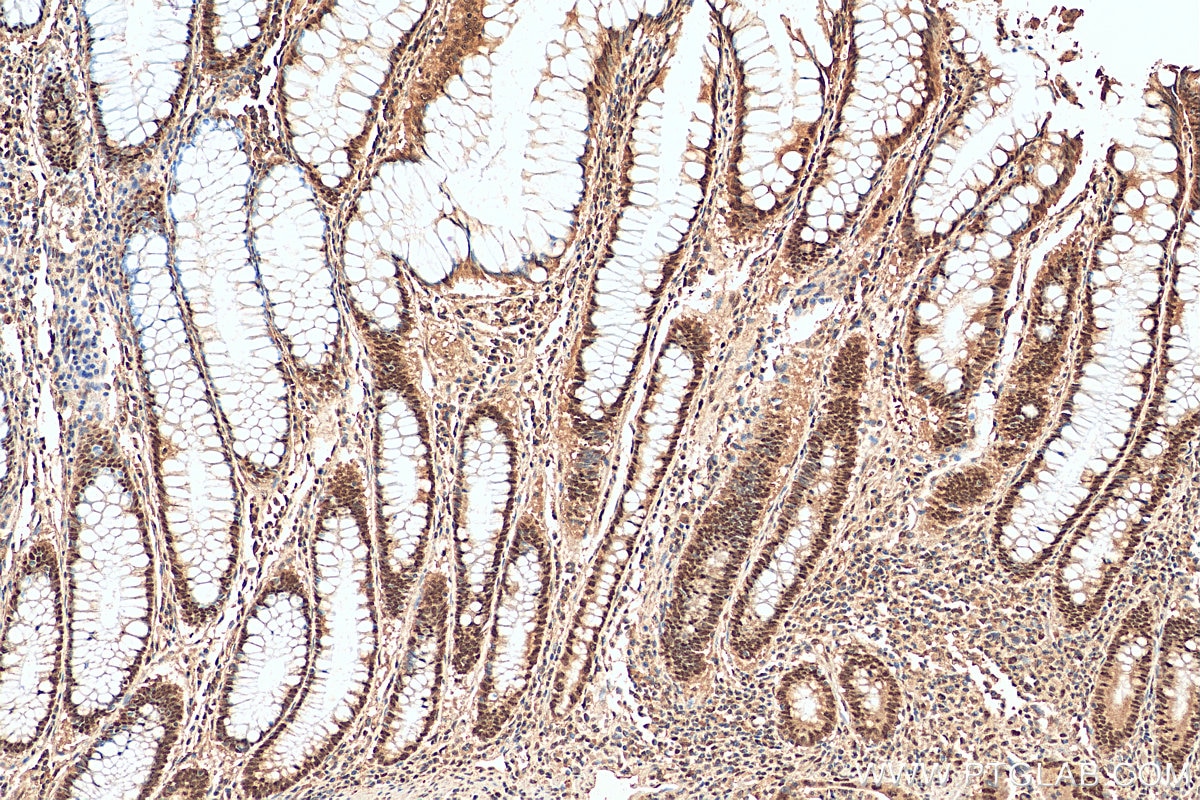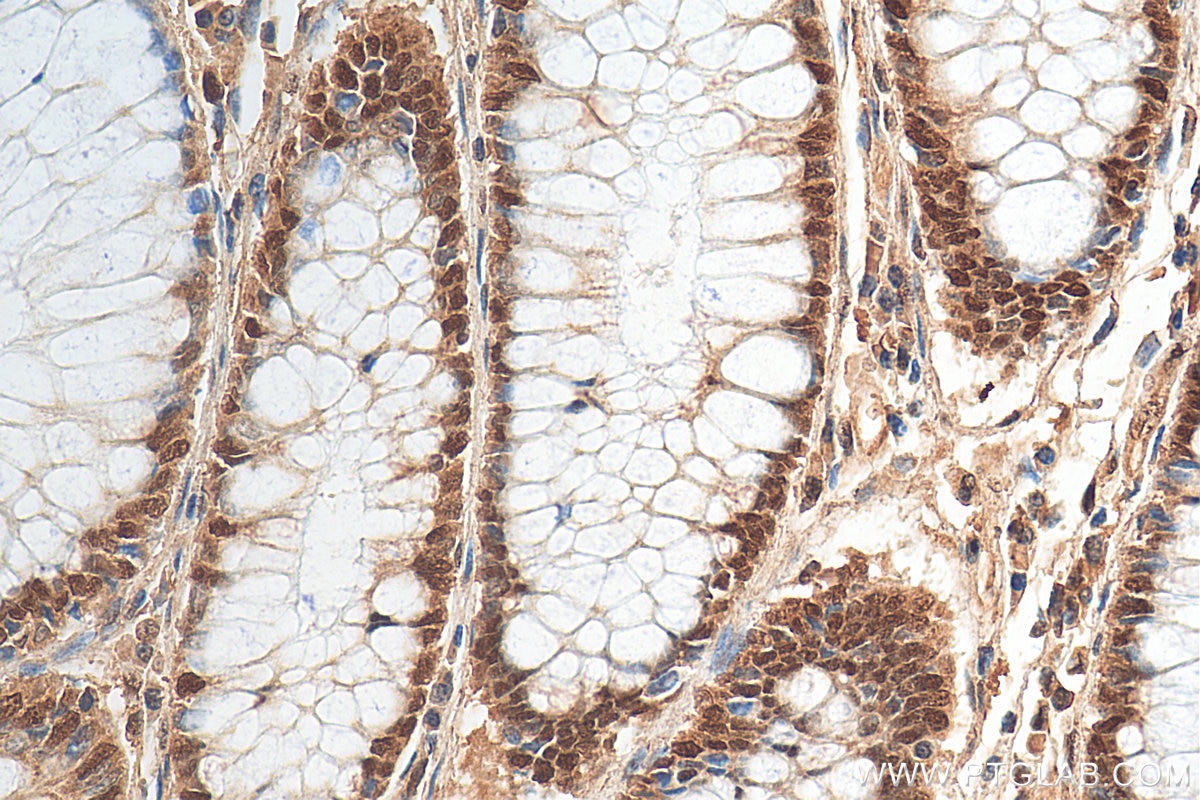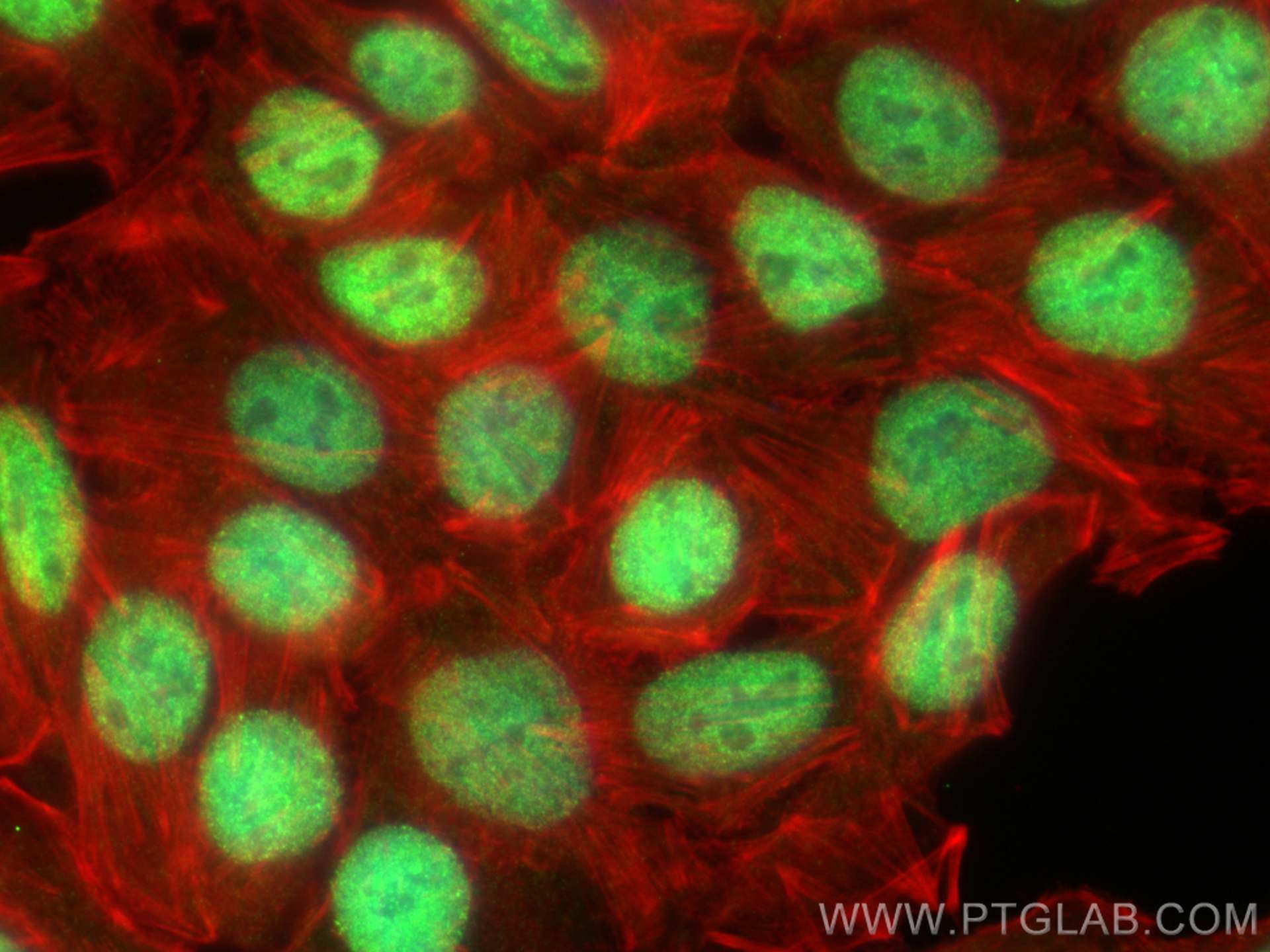- Featured Product
- KD/KO Validated
MSH3 Polyklonaler Antikörper
MSH3 Polyklonal Antikörper für WB, IHC, IF/ICC, IP, ELISA
Wirt / Isotyp
Kaninchen / IgG
Getestete Reaktivität
human und mehr (1)
Anwendung
WB, IHC, IF/ICC, IP, ELISA
Konjugation
Unkonjugiert
Kat-Nr. : 22393-1-AP
Synonyme
Geprüfte Anwendungen
| Erfolgreiche Detektion in WB | A549-Zellen, HEK-293-Zellen, HeLa-Zellen |
| Erfolgreiche IP | HeLa-Zellen |
| Erfolgreiche Detektion in IHC | humanes Kolonkarzinomgewebe Hinweis: Antigendemaskierung mit TE-Puffer pH 9,0 empfohlen. (*) Wahlweise kann die Antigendemaskierung auch mit Citratpuffer pH 6,0 erfolgen. |
| Erfolgreiche Detektion in IF/ICC | HT-29-Zellen |
Empfohlene Verdünnung
| Anwendung | Verdünnung |
|---|---|
| Western Blot (WB) | WB : 1:5000-1:50000 |
| Immunpräzipitation (IP) | IP : 0.5-4.0 ug for 1.0-3.0 mg of total protein lysate |
| Immunhistochemie (IHC) | IHC : 1:50-1:500 |
| Immunfluoreszenz (IF)/ICC | IF/ICC : 1:50-1:500 |
| It is recommended that this reagent should be titrated in each testing system to obtain optimal results. | |
| Sample-dependent, check data in validation data gallery | |
Veröffentlichte Anwendungen
| KD/KO | See 1 publications below |
| WB | See 7 publications below |
Produktinformation
22393-1-AP bindet in WB, IHC, IF/ICC, IP, ELISA MSH3 und zeigt Reaktivität mit human
| Getestete Reaktivität | human |
| In Publikationen genannte Reaktivität | human, Maus |
| Wirt / Isotyp | Kaninchen / IgG |
| Klonalität | Polyklonal |
| Typ | Antikörper |
| Immunogen | MSH3 fusion protein Ag18060 |
| Vollständiger Name | mutS homolog 3 (E. coli) |
| Berechnetes Molekulargewicht | 1137 aa, 127 kDa |
| Beobachtetes Molekulargewicht | 127 kDa |
| GenBank-Zugangsnummer | BC130434 |
| Gene symbol | MSH3 |
| Gene ID (NCBI) | 4437 |
| Konjugation | Unkonjugiert |
| Form | Liquid |
| Reinigungsmethode | Antigen-Affinitätsreinigung |
| Lagerungspuffer | PBS with 0.02% sodium azide and 50% glycerol |
| Lagerungsbedingungen | Bei -20°C lagern. Nach dem Versand ein Jahr lang stabil Aliquotieren ist bei -20oC Lagerung nicht notwendig. 20ul Größen enthalten 0,1% BSA. |
Hintergrundinformationen
MSH3 is a DNA mismatch repair (MMR) gene that heterodimerizes with MSH2 to form MutS beta which binds to DNA mismatches thereby initiating DNA repair. It undergoes frequent somatic mutation in colorectal cancers (CRCs) with MMR deficiency. MSH3 mismatch repair protein regulates sensitivity to cytotoxic drugs and a histone deacetylase inhibitor in human colon carcinoma cells (PMID: 23724141, PMID:32671096).
Protokolle
| PRODUKTSPEZIFISCHE PROTOKOLLE | |
|---|---|
| WB protocol for MSH3 antibody 22393-1-AP | Protokoll herunterladen |
| IHC protocol for MSH3 antibody 22393-1-AP | Protokoll herunterladenl |
| IF protocol for MSH3 antibody 22393-1-AP | Protokoll herunterladen |
| IP protocol for MSH3 antibody 22393-1-AP | Protokoll herunterladen |
| STANDARD-PROTOKOLLE | |
|---|---|
| Klicken Sie hier, um unsere Standardprotokolle anzuzeigen |
Publikationen
| Species | Application | Title |
|---|---|---|
Mol Cancer CircLIFR synergizes with MSH2 to attenuate chemoresistance via MutSα/ATM-p73 axis in bladder cancer. | ||
Sci Adv Deficiency in mammalian STN1 promotes colon cancer development via inhibiting DNA repair | ||
Hum Mol Genet Lack of association of somatic CAG repeat expansion with striatal neurodegeneration in HD knock-in animal models. | ||
bioRxiv D-type cyclins regulate DNA mismatch repair in the G1 and S phases of the cell cycle, maintaining genome stability | ||
J Immunother Cancer Protein arginine methyltransferase 6 enhances immune checkpoint blockade efficacy via the STING pathway in MMR-proficient colorectal cancer |
Rezensionen
The reviews below have been submitted by verified Proteintech customers who received an incentive for providing their feedback.
FH Daniela (Verified Customer) (03-17-2022) | In western blot we observed multiple bands, but none at the expected molecular weight. In immunofluorescene, staining was citoplasmatic, while MSH3 is expected to be in the nucleus.
 |
